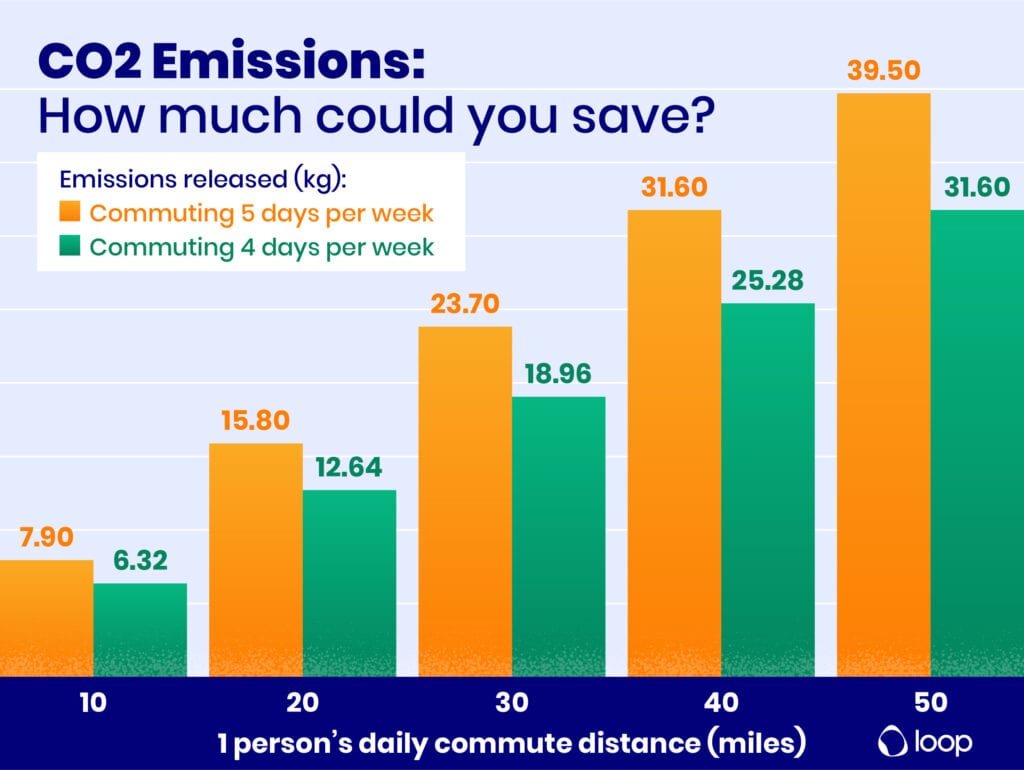The difference a day makes – research reveals cutting your commute by one day per week could save over 379kg of CO2 emissions
- Research reveals cutting your commute by just one day per week would save the same CO2 as one person’s passenger flight to Istanbul
- Loop is calling for commuters to consider cutting their commute to help tackle the climate emergency
- Working from home doesn’t mean rising bills – simple steps can help households keep their energy bills in check
As lockdown restrictions in the UK continue to ease, home energy-saving assistant, Loop, is urging commuters to consider working from home more to help tackle the climate emergency as it reveals cutting your commute by just one day per week could save 379.2kg of CO2 emissions – or the same amount locked up by 190 trees[1].
Analysing data on the emissions released over a range of commuting distances, Loop found that commuters with a 50-mile round trip Monday to Friday would save around 379.2kg of CO2 emissions every year by working from home just one day per week[2]. That’s equivalent to more than 2,433km on a short-haul flight –the same distance as one passenger’s trip from London to Istanbul.
Workers with shorter daily commutes can make a significant difference too. Those with a 10-mile daily commute would save around 75kg CO2 over the course of a year by working from home just one day per week – the same amount of emissions released per passenger on a flight from London to Dublin.
 Steve Buckley, Head of Data Science at Loop says: “Changing our day-to-day travel habits is undoubtedly one of the most significant ways we can limit our individual impact on the environment.
Steve Buckley, Head of Data Science at Loop says: “Changing our day-to-day travel habits is undoubtedly one of the most significant ways we can limit our individual impact on the environment.
“The way many organisations both large and small adjusted to moving their workforce online in response to the global coronavirus pandemic has demonstrated just how adaptable they can be. As we emerge from lockdown and begin to get back to a ‘new normal’, it’s vital that we take some of the more positive habits forward with us so we can collectively tackle one of the biggest challenges facing us – climate change.”
For those worried about their energy consumption while working from home, Loop has shared some easy ways to reduce energy use and save money on energy bills at the same time.
Steve says: “Spending more time at home usually equates to higher energy bills. However, we’ve seen that even making simple changes while working at home can make a big difference to your bills.”
“But it’s not just about saving money – using less energy is also about helping to tackle climate change. The nation’s awareness of the impact of carbon emissions is growing by the day, and most people want to do something to stop it.”
“If home working is likely to become a regular occurrence for you in the future, it’s also worth considering whether solar panels could now be a sensible choice. If you’re now at home more during the day, you’ll make more use of your clean home-grown power.”
Below are Loop’s six top tips for keeping on top of your energy usage while working from home:
- Reduce your Phantom Load
 Some appliances need to be left on all the time (like a fridge or freezer) or kept on standby (like a smart speaker) but many appliances are left on that don’t need to be. This background electricity use is known as “Phantom Load”, because of the way in which energy is invisibly drained without users necessarily knowing about it.
Some appliances need to be left on all the time (like a fridge or freezer) or kept on standby (like a smart speaker) but many appliances are left on that don’t need to be. This background electricity use is known as “Phantom Load”, because of the way in which energy is invisibly drained without users necessarily knowing about it.
Make sure you keep your Phantom Load low by turning items off when they’re not in use, such as laptops and desktops you are using to work from home. Household appliances like multi-room speakers and digital TV boxes can also contribute to rising costs, so switching things off at the plug when they’re not in use is a must.
2. Swap to LED bulbs
 If you’re at home it’s reasonable to expect your lights will be on more often, so there’s even more reason to swap to LEDs. If you replace all of the bulbs in your home with LEDs, then for an initial outlay of around £100 for an average house, you’ll save about £35 a year on your energy bill.
If you’re at home it’s reasonable to expect your lights will be on more often, so there’s even more reason to swap to LEDs. If you replace all of the bulbs in your home with LEDs, then for an initial outlay of around £100 for an average house, you’ll save about £35 a year on your energy bill.
3. Switch your supplier or tariff
If you’re not sure which energy tariff you’re on, or when it’s due to come to an end, now could be the perfect time to check you’re still on the cheapest deal. If you haven’t switched supplier or tariff for over a year, there’s a chance you could be on a pricey standard variable tariff, so use an energy-saving assistant like Loop or head to a compare deals to find a cheaper option. There is no easier way to save hundreds of pounds!
With almost half of consumers reporting to have never switched, Loop recently revealed UK homeowners on pricey default tariffs could collectively be wasting over £1bn[3] every year on their energy bills and paying over £200 more than those on fixed rate tariffs.
4. Consider solar
 If you are likely to be spending more time at home than you were before, you could now be a good candidate for solar panels as you’ll have the opportunity to use more of the power they produce. By shifting your power-draining activities around you can maximise your self-sufficiency and reduce your reliance on grid power. For example, doing your washing during the day rather than the evening means your wash is powered by free solar energy rather than expensive and dirtier peak-time grid energy – better for you, better for the environment.
If you are likely to be spending more time at home than you were before, you could now be a good candidate for solar panels as you’ll have the opportunity to use more of the power they produce. By shifting your power-draining activities around you can maximise your self-sufficiency and reduce your reliance on grid power. For example, doing your washing during the day rather than the evening means your wash is powered by free solar energy rather than expensive and dirtier peak-time grid energy – better for you, better for the environment.
5. Think ahead – help is at hand!
 The government’s Green Homes Grant is coming at just the right time for households wanting to get smart about their energy use. It’s quite a complex area but if you play it right the grant could cover a large chunk of improvements to insulation, low-carbon heating, heating controls, draught proofing, glazing and doors.
The government’s Green Homes Grant is coming at just the right time for households wanting to get smart about their energy use. It’s quite a complex area but if you play it right the grant could cover a large chunk of improvements to insulation, low-carbon heating, heating controls, draught proofing, glazing and doors.
Even if you’re not in a position to take advantage of the scheme, it’s also worth considering whether your home’s heating is optimised and ready for the winter months. Things like turning the temperature down on the thermostat by just 1 degree could save you up to £80 and reduce your home’s carbon dioxide emissions by up to 320kg, all without you even noticing.
If you’ve got the heating on for longer while you’re working from home, make sure you have bled all your radiators and move any sofas away from them to ensure heat can circulate properly too. Investing in a smart thermostat and ensuring you’re only heating rooms you need to will also help you to keep costs down.
- Keep calm and make a cuppa
 Whether you’re still in the office or working from home, a morning cuppa is likely to be top of your to-do list, but make sure you only fill the kettle with the water that you need. The savings are around £6 a year, but every penny counts!
Whether you’re still in the office or working from home, a morning cuppa is likely to be top of your to-do list, but make sure you only fill the kettle with the water that you need. The savings are around £6 a year, but every penny counts!
Help keep news FREE for our readers
Supporting your local community newspaper/online news outlet is crucial now more than ever. If you believe in independent journalism, then consider making a valuable contribution by making a one-time or monthly donation. We operate in rural areas where providing unbiased news can be challenging. Read More About Supporting The West Wales Chronicle























